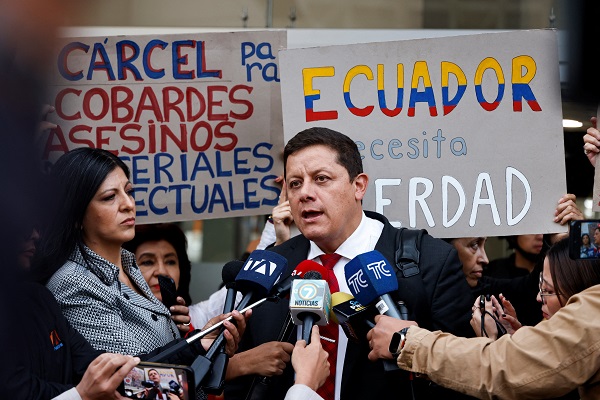 Hugo Espin, lawyer of Veronica Sarauz, widow of Fernando Villavicencio, talks to the media after a court handed down prison sentences for five people found guilty of murdering presidential candidate Fernando Villavicencio, in Quito, Ecuador, 12 July 2024;
Credit: Reuters/Karen Toro
Hugo Espin, lawyer of Veronica Sarauz, widow of Fernando Villavicencio, talks to the media after a court handed down prison sentences for five people found guilty of murdering presidential candidate Fernando Villavicencio, in Quito, Ecuador, 12 July 2024;
Credit: Reuters/Karen Toro
QUITO (Reuters) - On Friday 12 July 2024, a court in Ecuador handed down prison sentences of twelve years and 34 years for five people found guilty of murdering presidential candidate Fernando Villavicencio.
Journalist and former legislator Villavicencio was shot while leaving a rally in August 2023, becoming the most prominent victim of Ecuador's spiraling violence.
The ruling, read out by Milton Maroto, one of the court's three judges, can be appealed by both the prosecution and the defence. The trial started at the end of June 2024.
Prosecutors accused at least two of those tried of belonging to the Los Lobos crime gang, among 22 criminal gangs designated as terrorists by President Daniel Noboa in January 2024.
According to the attorney general's office, Carlos Edwin Angulo Lara, known as "El Invisible" (The Invisible), gave the order to murder Villavicencio from prison, while Laura Dayanara Castillo was in charge of logistics.
Both Angulo and Castillo were sentenced to 34 years and eight months.
Erick Ramirez, Victor Flores and Alexandra Chimbo were sentenced to twelve years.
Villavicencio, whose journalism exposed corruption and connections between organised crime and politicians, had long faced threats.
Prosecutors are undertaking a separate investigation into who requested the murder.
One of the hit men died at the scene of Villavicencio's murder and seven other suspects - mostly Colombian citizens - were murdered in October 2023 while being held in prisons on pre-trial detention.
Villavicencio's friends and family have decried multiple delays and urged investigation into who ordered the killing.
Veronica Sarauz, Villavicencio's widow, had asked judges earlier on Friday in a post on X to apply the full weight of the law to those accused.








